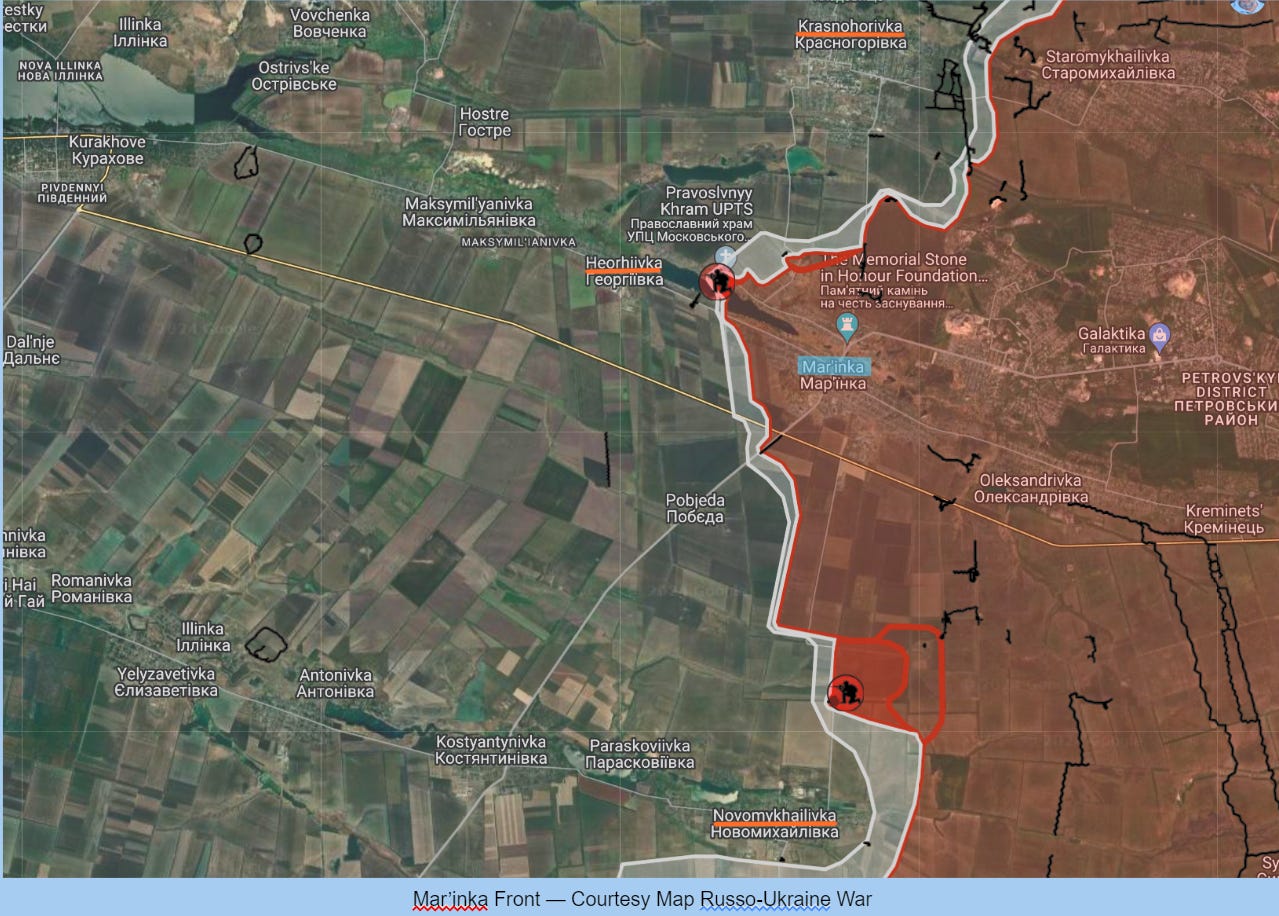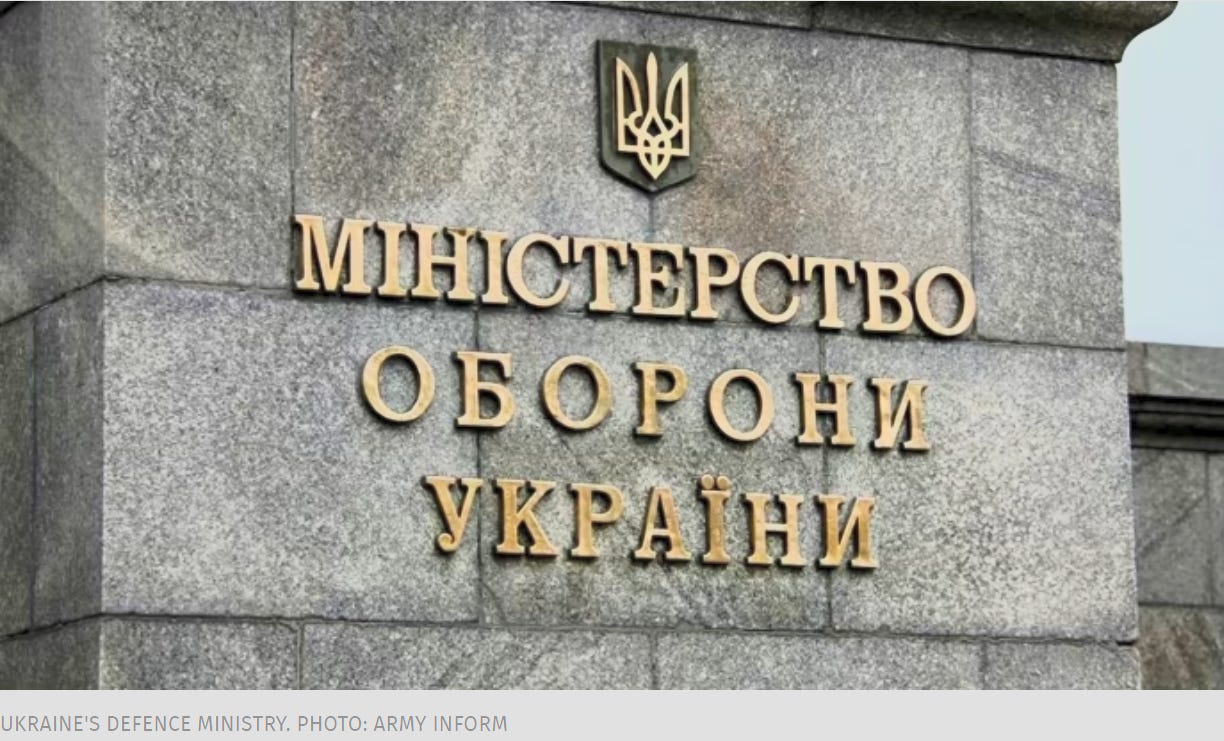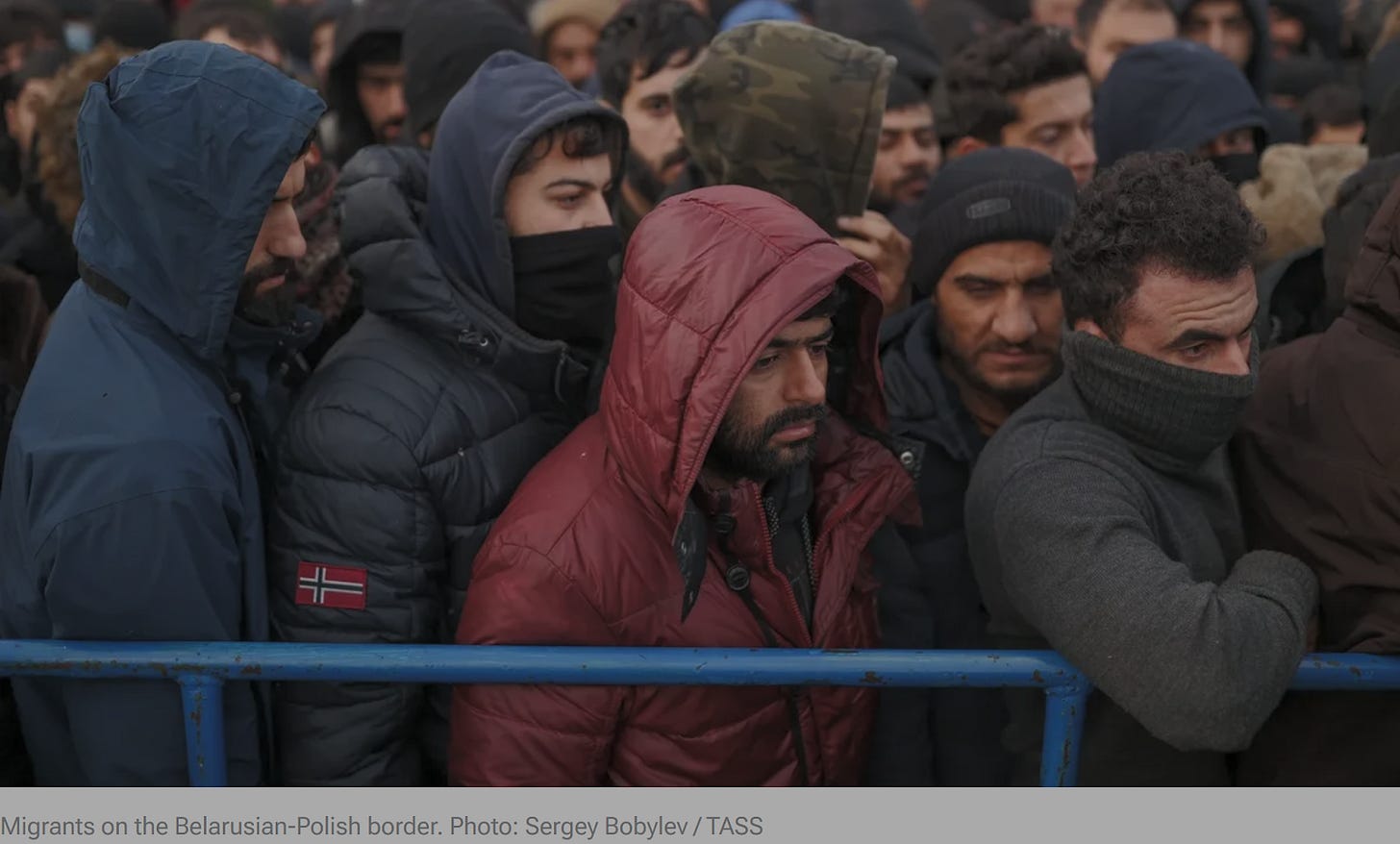Slava Ukraini! Since June 2023 I have provided a daily draft for the Ukraine War Brief Podcast collecting news from over 40 sources daily much of which ends up in the script. I will make this Draft available here for those who wish to keep up with events on a daily basis.
INSIDE UKRAINE
ALONG THE CONTACT LINE
GSAFU Morning Report
The General Staff of the Armed Forces of Ukraine in its situation update at 06:00 on Feb. 02 stated that it was day 709 of the full-scale invasion of the Russian Federation against Ukraine.
During the past day, 63 combat engagements took place. Over the past 24 hours, the enemy carried out 2 missile strikes, 85 air strikes, and 79 MLRS attacks across the positions of our troops and settlements. As a result of the Russian attacks, unfortunately, there are dead and wounded among the civilian population. Destruction and damage to residential buildings and other civilian infrastructure.
Russian aircraft are less effective from the Azov Sea
Yuriy Ihnat, spokesman for the Air Force of the Armed Forces of Ukraine, on the air of the nationwide telethon stated that Russian planes are less active from the Azov Sea because they are afraid of being hit by the Defense Forces.
"From the Sea of Azov, they are less effective there, they need to fly closer to the line of contact so that the KAB [KAB 500 bombs] can reach where they plan to. As we said, the KAB flies about 70 km. That is, they approach the line of contact to the potential location of our anti-aircraft missile systems about 50 km away, fly high, release the KAB, turn around and fly back. The KAB already covers a distance of 70 km, so KABs are flying into the depth of the defense of 20 km," Ihnat said.
The Khortytsia operational-strategic group is responsible for the Kup’yans’k, Lyman, and Bakhmut axes, in the northeastern part of Ukraine.
Kup’yans’k axis: Ukrainian defenders repelled 5 attacks of the enemy near the settlement Ivanivka (Kharkiv oblast)
Lyman axis: Ukrainian defenders repelled an attack near Terny, (Donetsk oblast)
Bakhmut axis: Ukrainian forces repelled one attack near Klishchiivka (Donetsk oblast)
The Tavria operational-strategic group is responsible for the Avdiivka, Mar’inka, Shaktars’ke, and Zaporizhzhia axes, in the central-eastern and southeastern part of Ukraine.
Avdiivka axis: Ukrainian defenders continue to hold back the enemy who keeps trying to encircle Avdiivka. AFU soldiers are standing their ground and inflicting major losses on the invaders. Ukrainian Defense Forces repelled 16 enemy attacks near Avdiivka, and 6 near Pervomais’ke and Nevel’s’ke (Donetsk oblast).
Mar’inka axis: Ukrainian Defense Forces continue to hold back the occupiers in the vicinities of Krasnohorivka, Heorhiivka, and Novomykhailivka (Donetsk oblast). Troops repelled 11 attacks in that area.
Shakhtarske axis: Ukrainian Defense Forces repelled 1 attack south of Zolota-Nyva, (Donetsk oblast)
Zaporizhzhia axis: Ukrainian Defense Forces repelled 1 attacks near Robotyne (Zaporizhzhia oblast).
The Odesa operational-strategic group is responsible for Kherson, Qırım, (also known as Crimea) and the Black Sea.
Kherson axis: Ukrainian defenders continue to expand the bridgehead. Despite significant losses, the enemy does not abandon its attempts to dislodge Ukrainian troops from their positions. Over the past day, the enemy carried 14 unsuccessful assaults on the positions of the Ukrainian Defense Forces.
Ukrainian Air Force — at least 3 Russian aircraft were damaged at Belbek
Colonel Yurii Ihnat, spokesman for the Air Force of Ukraine stated that the strike on the Belbek airfield in temporarily occupied Crimea on 31 January probably hit at least three Russian aircraft and some personnel.
“This is probably more of a question for our intelligence [about the targets hit]... The best confirmation is, of course, satellite images that are already available on the internet, where something can indeed be seen. But even better confirmation is the obituaries in Russian news outlets – the fact that they themselves admit to the damage and are posting information about it. At the very least, there were three aircraft there, then some personnel were killed."
TEMPORARILY OCCUPIED TERRITORIES
Nothing to report.
THE HOME FRONT
Russian drone assault cuts power for thousands, traps 100+ miners underground
Ukraine’s Air Force reported Russia attacked the country with 24 Shahed-136/131 suicide drones in the early hours of 2 February. The air assault originated in the south, with the Shaheds launched from Cape Chauda in occupied Crimea and Russia’s Primorsko-Akhtarsk, targeting critical infrastructure facilities in Dnipropetrovsk Oblast, in particular.
Dnipropetrovsk Oblast chief Serhii Lysak reported that the Russian attack targeted the Kryvyi Rih district with the Shaheds.
He said some drones hit targets, causing power outages for more than 40,000 people and two mines, trapping more than 100 miners underground. Some of the miners were rescued at the moment of the publication of Lysak’s report at 8:00 a.m.
Ukraine's Defence Minister suspends acting director regarding suspected corruption
Ukraine’s Defence Ministry announced that Toomas Nahkur, Acting Director of the Department of Military and Technical Policy, Development of Arms and Military Equipment of the Ministry of Defence of Ukraine, has been suspended from his post after being served with a notice of suspicion in the case of embezzlement of almost UAH 1.5 billion [roughly US$39 million] allocated for the purchase of ammunition.
"Toomas Nahkur, Acting Director of the Department of Military and Technical Policy, Development of Arms and Military Equipment of the Ministry of Defence of Ukraine, shall be suspended from performing his official duties by the decision of Rustem Umierov, the Minister of Defence of Ukraine, dated 1 February 2024, at the request of Lieutenant General Ivan Havryliuk, Deputy Minister of Defence of Ukraine."
The Ukrainian MoD clarified that the reason behind Nahkur’s suspension was a notice of suspicion in a criminal case. Nakhkur was served with a notice of suspicion on 27 January.
THE RUSSIAN WORLD
Russia deceives Syrians into military service, promising guard duty in Yakutia, citizenship
According to an investigative report by journalist Vadim El Khayek published in “Novaya Gazeta,” Russia is reportedly deceiving Syrians, who may not even speak Russian, into signing contracts with the Russian Ministry of Defense.
Syrian alleged intermediary Wassim Al Dimashki, previously involved in recruiting individuals for Wagner Group operations in Libya, is now recruiting Syrians for military service in Russian forces.
Wassim informs young Syrians that they will travel to Yakutia to guard gold mines and diamond deposits, citing the vastness of the region and its insufficient local population for such a job. The promised salary for this work is around $2,000 per month, in addition to receiving a Russian passport.
Upon arriving in Moscow, “doctor” Akram Dib Tarraf, a Syrian citizen, met them. He reportedly received nearly $3,600 for every individual who signed a contract with the Russian armed forces, although the source of his payment remains unclear.
The investigation suggests that the Syrians who are sent to Yakutia are divided into two groups upon arrival. One group is sent to Ulan-Ude for military specialization training, while the other goes to a field camp for infantry training.
Notably, none of the new recruits reportedly speak Russian, but they sign contracts in Russian.
Ukraine requests repatriation of bodies of those allegedly killed on board Il-76, but Russia doesn’t respond
Andrii Yusov, a representative of Defence Intelligence, has said that Ukraine has approached Russia about repatriating the bodies of the prisoners of war who Moscow propagandists say were on board the downed Il-76 aircraft, but Russia is not responding.
Yusov said that the exchange of prisoners of war on 31 January was "almost the completion" of the disrupted operation on the day of the Il-76 incident. He said those who came home as part of the exchange were the Ukrainians who should have been exchanged on 24 January – with the exception of the 65 people on the list published by Kremlin-controlled Russian propagandists.
“Therefore, our state's demand for an impartial international investigation remains relevant, not only to look into the circumstances in which the Il-76 was downed, but also to find out what was actually on board — whether there were people or ammunition, and who was there besides the crew. So far, Russia has not confirmed the process of an international open investigation."
— Andrii Yusov, a representative of Defence Intelligence
Corruption continues to plague the Russian army
The UK Ministry of Defence in its Feb. 2 Intelligence Update stated that a new review by independent Russian newspaper Verstka has analysed corrupt schemes within the Russian army, stating that this undermines the effectiveness of the military, but the likelihood of reducing this corruption level is low.
The review claims it is likely that corruption significantly undermines the effectiveness of the Russian military. There is only a remote chance that significant progress will be made in reducing corruption levels. The review revealed corruption schemes and a system of bribery among the Russian military and their commanders.
Specifically, bribes were given or demanded for various "services," such as a leave, certification of physical training, a military rank, driver licences, and avoiding disciplinary action against soldiers for using smartphones or drinking.
After February 2022, the range of "services" was expanded by including injury certificates, awards for participating in the "special military operation" (as the war against Ukraine is called in Russia – ed.) and avoiding being sent on a combat mission.
Verstka published estimates for these "services" ranging from RUB 40,000 for a deferment from being sent to the front to RUB 1 million for an injury certificate.
MOD Intelligence reiterates that corruption has long been a problem in the Russian armed forces and recalls journalist Dmitry Kholodov, who investigated military corruption in the 1990s and was killed in Moscow in 1994.
NEWS WORLDWIDE
US Senate announces key vote on Ukraine aid next week
After an EU summit secured €50 billion in aid for Ukraine, overcoming Hungary’s opposition, the US Senate announced its upcoming long-expected vote on Ukraine aid.
The US has been Ukraine’s biggest financial supporter amid Russia’s invasion, yet the Pentagon has depleted Ukraine aid funds by the end of 2023, while the US Congressional Republicans have been stalling the approval of new aid funding for months. The lack of military aid degrades Ukraine’s military capabilities, benefitting Russia.
Sky News reports that the US Senate is set to vote on a bill that allocates funding for Ukraine, Israel, and US border security “before next Thursday,” 9 February.
“We cannot simply shirk from our responsibilities just because the task is difficult,” said Chuck Schumer, the chamber’s top Democrat.
Canada’s Foreign Minister visits Ukraine to address Russia’s forced deportation of Ukrainian children.
Canadian Foreign Affairs Minister Mélanie Joly is on a surprise two-day visit to Ukraine, coinciding with the nearing two-year mark of Russia’s extensive invasion. Her agenda includes revealing a new effort aimed at combating the forced deportation of children by Russian forces, CBC reports.
"Children cannot be used as pawns in war. In their faces, we see our humanity and Canada is proud to lead the effort alongside Ukraine to ensure their return home to Ukraine," Joly said in a media statement announcing her trip.
We will work with countries that have direct relations with Russia to make sure that these children come back home," Joly said. "Every child that is being brought back to its family is a victory in itself."
As part of the initiative, Canada has offered "technical expertise and resources" to help repatriate Ukrainian children, the press release said.
MILITARY & TECH
Zaluzhnyi presented an article on his strategy for Ukraine to defeat Russia
The Ukrainian Armed Forces published an essay on February 1 by Commander-in-Chief General Valerii Zaluzhnyi titled “On the Modern Design of Military Operations in the Russo-Ukrainian War: In the Fight for the Initiative,” wherein Zaluzhnyi argued that the requirements for any given war are unique and that these requirements dictate a unique strategy for victory. We have included a summary of the essay below.
Zaluzhnyi presented an overarching strategy to seize the theater-wide initiative in Ukraine and retain it to facilitate Ukrainian battlefield victories despite Russia’s numerical advantages in manpower and materiel.
Zaluzhnyi’s strategy aims to offset Ukraine’s existing challenges and pursue advantages over the Russian military through widespread technological innovation and adaptation.
Zaluzhnyi identified “decisive conditions” for Ukraine to conduct successful operations, which include achieving absolute air superiority to enable effective Ukrainian fires, logistics, and reconnaissance; seizing the initiative by denying Russian forces the ability to conduct offensive or defensive operations; increasing Ukrainian mobility while limiting Russian mobility; securing safe access to unspecified key lines and important terrain; and denying Russian forces any opportunities to recapture lost positions and increase Russian operational efforts.
The decisive conditions highlighted would effectively give Ukrainian forces the theater-wide initiative and set conditions for Ukraine to conduct operationally significant defensive and offensive operations. Zaluzhnyi argued that the rapid development of new technology changes the means by which Ukraine can achieve these “decisive conditions” and that Ukrainian forces cannot use conventional methods to achieve these conditions given Russia’s superior ability to mobilize men. New technological means, such as drones, unmanned systems, systems integration, and other advanced technological systems can allow Ukrainian forces to maximize their combat potential using fewer resources and inflict maximum damage on Russian forces.
Ukraine’s limitations and geopolitical challenges are incentivizing Ukraine to pursue the development and institutionalization of these new means. Zaluzhnyi stated that an “unstable political situation around Ukraine” has led to reduced international military support for Ukraine, that Russia will likely try to provoke other conflicts to further draw the West’s attention away from Ukraine, and that Ukraine’s partners have depleted their missile and artillery ammunition stocks without the means to rapidly produce these weapons.
In the article Zaluzhnyi argues that ineffective sanctions allow the defense industrial bases (DIBs) of Russia and its partners to support a positional war of attrition that benefits Russia over Ukraine and that Russia has a significant advantage over Ukraine in the mobilization of human resources. Zaluzhnyi further highlighted imperfect Ukrainian regulatory frameworks to expand Ukraine’s DIB, although Ukrainian officials are increasingly prioritizing efforts to remedy this issue. Zaluzhnyi notably concluded that the uncertain nature of the war in Ukraine makes it difficult for Ukraine’s allies to determine specific security assistance priorities for Ukraine.
Zaluzhnyi stated that the “main option for gaining an advantage is to master the entire arsenal of relatively cheap, new, and extremely effective and rapidly developing assets.” Zaluzhnyi specifically highlighted unmanned systems as an area where Ukraine can leverage new capabilities since they can provide continuous situational awareness, support round-the-clock fire and strikes in real-time, provide real-time intelligence, and produce accurate targeting information for strikes on the frontline and in rear areas.
Zaluzhnyi called on Ukraine to introduce a new “philosophy” for the preparation and conduct of military operations that would allow Ukrainian forces to cohesively employ these new methods in pursuit of a cohesive objective. He stated that new technological means will also expand the types of operations Ukraine can conduct in support of the war, which may include operations to reduce Russia’s economic potential, operations aimed at Russia’s complete isolation and exhaustion, robotic search and strike operations, robotic operations to control a crisis area, psychological operations, and defensive “contactless” operations. Zaluzhnyi also called on Ukrainian forces to systematically advance separate lines of effort to generate “necessary effects” in developing a coherent “digital field”; controlling the radio-electronic (the cyber-electromagnetic domain) situation along the frontline; combining attacks with unmanned and cyber assets; and improving logistics.
Zaluzhnyi specifically suggested that retooling operations to integrate unmanned systems may allow Ukrainian forces to conserve personnel, weapons, and equipment while inflicting massive strikes on Russian military assets and infrastructure.
Zaluzhnyi called on Ukraine to overhaul its war effort to create “a completely new state system of technological reequipment" to master new assets and their operation. Zaluzhnyi advocates for Ukraine to retool state systems to support Ukrainian research, development, scientific support, production and maintenance, personnel training and the generalization of combat experience, the employment of forces, flexible financing, and logistics in order to prioritize the development and employment of rapidly developing technology. He added that Ukraine could create the system he envisions, with a sufficient volume of production, within five months.
Zaluzhnyi concluded that this new system, alongside a new approach to military operations, can enable Ukraine to stop Russia’s current aggression and protect Ukraine in the future.
That’s it for today’s Draft folks if you would like to keep up with events in Ukraine daily please consider subscribing, its free!
Feel free to share this update with your friends. Heroyam Slava!























